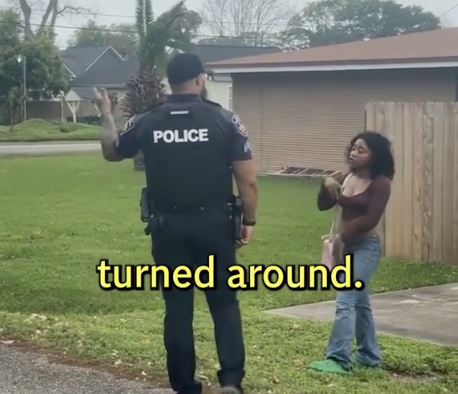A pregnant Black woman in Groves, Texas, says she was unfairly targeted by police after being issued a ticket for walking on the “wrong side” of the road—while her white husband, who was with her, received no such citation.
On April 9, Akia Townes was walking along Madison Boulevard searching for her lost dog when two officers from the Groves Police Department stopped her just two houses away from her home.
According to Townes, the officers exited their vehicle with their hands on their guns and asked to see her identification before informing her she was being cited for a traffic violation.
“Two cops stopped me,” Townes told KDFM. “They walked out with their hands on their guns, and then they asked me to see my ID.”

Her husband, Brad Townes, who is white, was present during the encounter but was not ticketed.
Viral Video Sparks Outrage
A now-viral TikTok video of the incident captured Brad questioning the officers’ actions, saying
“Can’t walk while being Black in Groves,” as he asked for their badge numbers. The video has drawn public attention to the apparent racial disparity in how the couple was treated.

Although Texas law does require pedestrians to walk on the left side of the street when there are no sidewalks—facing oncoming traffic—Townes noted that others in the neighborhood routinely walk in the same manner without being stopped or cited.
When Akia raised her voice in frustration, the police called for backup, bringing the number of officers on the scene to four. The department later explained that two officers were undergoing field training, hence the added presence.
“It’s just very an excessive force of power for me just trying to go and find my dog,” Townes said. “You could have easily said ‘Hey ma’am,’ and I could have explained to you what I was trying to do, but then you threatened my husband and threatened me to go to jail.”
Groves Police Respond

In response to mounting criticism, Groves City Marshal Chris Robin defended his department and dismissed allegations of racial profiling.
“We’ve seen so many different minor ordinance violations turn into something tragic, and we don’t want that to occur,” Robin said. “We want to be able to make a difference in making our community safer.”
Robin disclosed that the department has “zero tolerance” for racism and that their actions were driven by a commitment to public safety.
Ongoing Debate on Police and Race
The incident has reignited conversations about racial disparities in policing, especially in minor infractions that escalate quickly for Black individuals.
Civil rights advocates point to this case as a textbook example of “walking while Black”—a term used to describe how mundane actions can draw disproportionate scrutiny from law enforcement when committed by people of color.
